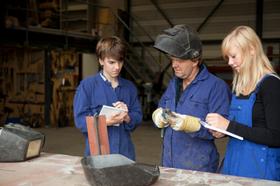Parent-teacher conferences can be a bit unnerving for parents regardless of how many times they’ve attended. It can be difficult to cover all the questions you have in a short period of time, and you may even leave the conference feeling like you weren’t able to accomplish much. However, there are practical steps you can take before, during, and after parent-teacher conferences to ensure you have all the information you need to support your child’s learning.
Before the Conference
Parent-teacher conferences are often set up such that parents have precious little time with each teacher, in many cases 10-15 minutes at the absolute most. Come to the conference prepared to get the most out of your appointment. Begin by reviewing your child’s grades beforehand, including their report card, any progress reports, work your child has brought home, and any comments your child’s teacher has made on his or her homework. Gathering as much information as you can ahead of time allows you to and be ready to dive into the discussion once your appointment time arrives. Some possible questions to ask include:
- Is my child performing at grade level?
- What are my child’s strengths? Weaknesses?
- What can my child do to improve academically?
- What can I do to help my child improve academically?
It’s important to be prepared whether your child is doing well or poorly. On the one hand, if your child is struggling, you’ll need to be familiar with why this is so, and examining his or her work can give you some insight into those reasons. It also allows you to be more informed ahead of time so you can ask your child’s teacher-specific questions about how to most effectively help your child boost his or her achievement. Conversely, being prepared when your child is performing well will allow you to utilize your appointment time to inquire about extended learning opportunities, such as clubs or organizations, or other non-grade issues, such as behavior or relationships with other students. Just because your child is doing well academically doesn’t mean there isn’t a lot you can still discuss.
This video offers tips on how to prepare for a parent-teacher conference.
Part of your preparations should also include a about how he or she feels they are doing. Take time to ask about grades, but also inquire about how they get along with their classmates, what subjects they like and don’t like, and how they like their teacher. Ask about the good and the bad to get a full picture of what’s happening. If you hear a lot of negative comments from your child, talk to other parents to see what their children are saying. Again, checking in before a parent-teacher conference and gathering information will help you focus your time with the teacher and address the areas of most concern to you and your child.
During the Conference
The purpose of the parent-teacher conference is not for your child’s teacher to talk at you and then send you on your way, nor is it intended to be a time when you berate the teacher for everything going wrong. The purpose is to have a two-way conversation, so you are on the same page about providing the best, supportive environment for your child to learn and grow. To establish rapport with the teacher, begin by offering praise for something they’ve done for your child, whether it’s leaving helpful comments on homework or offering before-school study sessions for tests. Teachers will often open with something complimentary about your child, such as their ability to follow instructions or willingness to help their classmates. Once you’ve both established a feeling of trust and mutual respect, the work can begin.
Since time is limited, ask your most important questions first. Whatever the issue, it should be something that you and the teacher can work on together, be it something positive for your child or addressing something that needs to be fixed. When addressing problems, it’s a good idea to avoid apologetic or angry reactions to issues that the teacher brings up. Although it’s difficult to hear not-so-good things about your child, just like you, your child’s teachers want them to succeed to the best of their abilities. Even if your child is the class star, be prepared to hear about areas in which they can improve.
Many educational experts believe that can help their teachers develop a better understanding of who they are as well as develop a good working relationship with them. Explain briefly, what your child’s interests and dislikes are, what they’re like at home, and any issues that may impact their performance or behavior in school. Many teachers have no idea what their students are like outside of school, and at the same time, many parents don’t know what their child is like outside of the home. Sharing a little of that information can be extremely insightful for both you and your child’s teacher.
This video offers a look at a parent-teacher conference.
If you have a child that’s old enough, consider bringing them to the parent-teacher conference. Your child’s education is a team effort between them, their teacher, and you. As such, including them in the conversation is a great way to demonstrate that teamwork and help them see that you are all in this together to support their academic pursuits. It’s also a good way to ensure that they know you are on the same page with their teacher and a good way to have your child take some personal responsibility for how things go in the classroom.
Before leaving the conference, be sure to inquire about the . Is it best to contact the teacher via email or telephone? What time periods of the day are best to talk? Establishing a framework for future discussions will help keep you all on track for your child’s success.
After the Conference
For many parents, parent-teacher conferences represent one of the only times they communicate with their child’s teacher all year. Although are playing with the idea of four parent-teacher conferences yearly, most schools only offer one each semester. To provide your child with the best environment in which to learn, it’s critical that you maintain communication with your child’s teacher.
It’s important to talk with your child after conferences as well. If your child was in attendance, debrief with them on the way home and outline what you felt were the highlights of the conversation. Be sure to remind them of what they’re doing well and begin to discuss plans for improving their performance in weak areas. Explain what you expect of them in terms of improved academic or behavioral performance, and have them outline what they’ll be doing to improve.
It’s also a good idea to identify a few things you can do at home to work on with your child. As you implement strategies to provide that assistance, follow up with your child’s teacher to fill them in on your progress, ask questions, or inquire about other things you can do to support your child’s education. If need be, schedule a follow-up meeting with your child’s teacher. These one-on-one meetings can allow all parties involved to delve deeper into the successes and failures that your child is experiencing without feeling the pressure of sticking to a 10-15 minute conference night appointment. Even sending periodic emails is a great way to keep the lines of communication open.
This video offers some questions to ask at a parent-teacher conference.
Conclusion
Although there are a multitude of factors that influence your child’s success in school, one of the most important is your involvement in the educational process. But engagement is much more than attending parent-teacher conferences once or twice a year. It’s schools reaching out to families in meaningful ways continuingly and families staying connected with teachers to support learning actively. To be most impactful, these connections must last over the school year and be a truly cooperative effort between you, your child, and your child’s teacher.
Questions? Contact us on Facebook. @publicschoolreview















